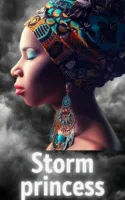Are you a male of over say, 16? Have you, like Aviwe, ever noticed something like this in daily life: ” … but all her attention was on me: the threat.” That women fear you, just because you’re a man?
And if you’re female, do you ever feel like that woman in the lift? Scared to be in any space alone with a strange man … or even a man you know? Of course, 100% you do.
This powerful story takes us deep into an urgent problem: the fear and harm caused by violent, sexist men in South Africa. Note that our society is abnormal. In most countries the rates of domestic violence, rape and femicide are way, way lower than ours.
We can change this, and the story asks us to think what each of us can do. More especially – what can men themselves do about it?
As Aviwe says, “So many bad things are happening to women and girls these days, mostly done by men, I’m starting to think that maybe all men really are trash.”
‘Men are trash’ has been trending on and off as a hashtag for a while now, worldwide. Every time a new case of gender-based violence (GBV) happens, it circulates again. Why, despite the protests that “not all men? Are trash?” as Zakhele says.
Aviwe has the reply: “It feels like we are, you know? With what happened to Madira. We’re all trash until no man is trash, until no-one is hurting women…”
Felleng’s character symbolises the ‘trashy’ man. Felleng:
– Routinely insults women, for example, describing them as ‘bitches’ and ‘cows’.
– Denies the problem, or says women bring it on themselves, and won’t listen to women: “Spare me. … Getting boring. Angry feminist bitches trying to tell men how to behave. I’m out of here.”
– Thinks, like many people, that raped women ‘asked for it’: “What did she [Madira] do?” It’s simply untrue. The facts are that every type of female, no matter what she is doing or wearing or where she is or how old she is, is raped: babies, grannies, gay women, naked women, clothed women, women out at night, women in their homes … Women are raped because of rapists, full stop.
– Believes women must ‘keep themselves safe’. See above: this is impossible. Men have to stop raping.
– Believes women must not ‘tell men what to do’ i.e. men are superior and in charge (as in the quote above).
– Believes men should just ‘take’ sex if they want: “So?” Felleng shrugs. “What’s that got to do with anything? I don’t need her to like me.” He’s a potential rapist.
– Believes in toxic male ‘honour’ and violent ‘punishment’ like that received by Zakhele.
Of course, the ideal is for every part of our society to instil in males, from birth, respect and care for women, and all life. Maybe Zakhele has a point that part of the problem is our huge number of ‘fatherless’ children. As reported in TimesLive, Stats SA says “Fathers were missing for more than six out of every 10 babies born in South Africa last year (61.7%). [2017]” Many boys lack positive male role models.
But take adult guys like Felleng and Jarvis. Can women change, educate, conscientize them? No, because they don’t respect women. More aware guys like Aviwe are open to learning, from women, to be better men. For the rest, men themselves need to turn things around.
And, toxic male behaviour must have consequences. It needs to become normal again that a bad man, like Madira’s rapist or Felleng, can be safely brought to justice. He gets away with the assault, but at least he does feel the consequence of being kicked out of the chef school.
Another attitude that must change is men thinking that they own women in some way. Even Aviwe is called out for this:
“Yes. Because it’s all wrong, that our women should have to go around being afraid all the time, like that.” I gesture to the closed lift to show what I mean.
“It’s wrong,” Ratu agrees. “Only, why must you men always talk about ‘our women’?”
“You don’t own us, you see,” Celi says in this gentle way …
If you own something, you feel you can do what you want with it, good or bad. Another situation we hear this is to justify xenophobic attacks: ‘These foreign men take our women’. Women can go out with whoever they want, men – just like you can!
The story suggests that you’re part of the problem if you hear toxic male talk and do nothing, for example when Aviwe overhears Felleng: “I’ll leave it to the rest of you to teach Baleka the lesson she’s asking for. But the hot little girl, Celi? She’s for me.”’
Aviwe is trying, but knows it’s difficult to confront men like Felleng:
“It’s hard most of the time. Ordinary guys like us?”
“I know, but if we keep quiet, we sort of … allow him to be like he is. … Give him permission.”
If you think Felleng’s brazen statement above ‘just happens in fiction’ and is unusual, think again. Look at this chilling finding, from this site here“… the results of a survey where one in four men admitted to having committed rape and nearly half admitted to raping more than one person…. “According to the researchers, many of the study’s participants appeared to see no problem with what they had done.”
The good men in our story agonise over how to be ‘better men’ and speak up, when men like Felleng do not respect them. Yet what else is there to do?
Talking up is one thing, but the story also highlights that we should take note of how we say things, and the vocabulary we use. We need to ditch the language of patriarchy.
Celi says: “… don’t say it that way, passive voice, like it’s just something that simply happened to Madira. Someone did it to her, so say it that way. Someone, a man, raped Madira,” not ‘she was raped’.
Then, how come grown men are ‘men’, and grown women remain perpetual ‘girls’? Or chicks? (It’s okay to use ‘girls and boys/guys’ in light-hearted situations.)
“I think we’re all a bit thoughtless,” I admit. “Us men. Maybe we need to sit down and talk with you girls … women. … Welp! What am I supposed to call them? Which word will offend them?” says Aviwe.
And remember when a guy says the prac ‘raped’ them? And Celi chides him, very serious and hurt: ‘only rape feels like rape’.
Plus there is ‘mansplaining’: men assuming they know more, like this example:
“Yes, you see, what you girls need to understand about rape, is this–” Felleng starts out …
“No, you don’t get to explain rape to us.” Celi speaks calmly and clearly…
A reality everyone in the story comes to acknowledge, is that sadly, females still do need ‘protection’, although they should not. Women can’t walk alone … just about anywhere.
Here is a challenge to show just how real this toxic male problem is. Make mental comparison lists. What safety threats might a male face in his daily and social life? What must he do to keep safe? Now make the same lists for a female.
The final message of the story is this:
“You know what’s the worst thing? Well, the worst for us,” Vhanga is saying. “We can’t even show we’re interested in a girl in the regular way. We’re all under suspicion.”
“And there’s nothing we can do to change it.” Zakhele is gloomy.
“Except try to be better men,” I say. “That’s it, that’s all we can do. We have to be better.”
Men, if you are feeling overwhelmed, there is help out there! Here are some of the many groups and projects focussed on building better men:
Father a Nation: “To raise up a generation of men who will build a safe and prosperous South Africa.”
Mankind Project: “The ManKind Project (MKP) is a global men’s community for the 21st Century. It’s about men helping other men and themselves discover how to be better men.”
Brothers for Life: “BfL has … a focus on the range of risk factors driving the spread of HIV and AIDS, including gender based violence (GBV), alcohol, and multiple concurrent partners.”
Men Engage: “MenEngage Alliance members work collectively and individually toward advancing gender justice, human rights and social justice….”







